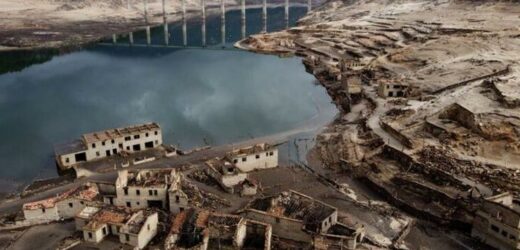Spain floods: Torrent rushes down street in Toldeo
We use your sign-up to provide content in ways you’ve consented to and to improve our understanding of you. This may include adverts from us and 3rd parties based on our understanding. You can unsubscribe at any time. More info
The reservoir in the village of Aceredo in the Galicia region of Spain has plunged to historically low levels. The area, which lies on the border with Portugal, was flooded back in 1992 when a Portuguese company created the Alto Lindoso reservoir and closed its floodgates. Now, a modern-day Atlantis has reappeared from under the Limia river over 30 years later.
The drought, which has been tipped to get worse over the coming weeks, has left the reservoir at about 15 percent of its capacity.
The reservoir, which has a 630-megawatt hydropower plant, does occasionally dip to low levels that reveal slight glimpses of the town.
But the water levels have gotten so low that the whole abandoned town has been put on display.
Maximino Perez Romero, from A Coruna, said: “It’s as if I’m watching a movie. I have a feeling of sadness.
“My feeling is that this is what will happen over the years due to drought and all that, with climate change.”


NASA has warned that while drought (a year with a below-average water supply) is a natural part of the climate cycle, global warming is making the weather event more frequent.
This is because hotter temperatures boost evaporation, which reduces surface water dries out soils and vegetation.
The Spanish draught has uncovered stacks of debris were once the doors or beams of now-destroyed buildings.
Also revealed was drinking fountain that still had water streaming through it from a rusty pipe.
Other notable discoveries include empty beer bottle crates stacked next to an old café, as well as a partially destroyed car.

A decent amount of houses in the old village, (there were 70 houses in total) were made from stone and wood and could be spotted still partially standing.
And stone walls which formed the outlines of farmland were also unveiled.
The small village was consisted of about 120 residents.
The lack of rain in recent months has played a big part in the drying up of the reservoir, according to mayor of Lobios council Maria del Carmen Yanez.
But she also pointed out Portuguese utility company EDP, which manages the reservoir carried out “quite aggressive exploitation”.
DON’T MISS
‘COVID-19 is the new syphilis’ – urgent warning over long-term effects [REPORT]
Vaccine breakthrough as UK to produce world’s first RSV jab [REVEAL]
Ukraine crisis: UK ‘must wake up’ and ‘tap into £1trn gas reserves’ [INSIGHT]

EDP claim that the historically low levels of the reservoir are because of the draught.
But it did say that it had been taking care of water resources “efficiently”.
Several villages in Spain reportedly complained last year about how dams are being managed
It came the size of a lake by Iberdrola in western Spain plummeted.
But EDP has argued that it followed all the rules and regulations.

Spain’s environment ministry data indicates that its reservoirs are currently at around 44 percent of their capacity.
That is far below the 61 percent of the last decade.
Back in 1968, the heads of state from Spain and Portugal to use their shared border rivers to build the Lindoso dam.
But to build it, houses and villages had to be abandoned to make way for the structure.
Furious residents were forced to leave their homes in four other villages in 1992 after the dam closed and made way for the waters.
The other villages included O Bao, Buscalque, A Reloeira and Lantemil.
Holidaymakers have now reportedly flocked to Aceredo to take a look at the newly revealed town that was once ditched 30 years ago.
Source: Read Full Article


